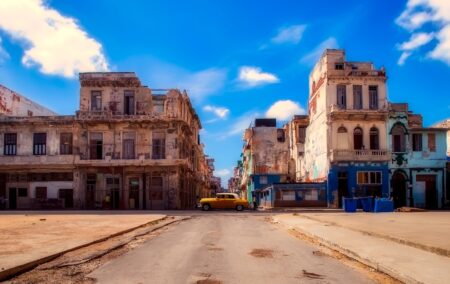Economic sanctions continue their wreckage. They strengthened Castro’s tyranny in Cuba, prolonged apartheid and now threaten war in Iran.
Sanctions are always destructive, usually producing the opposite of the intended effect and are invariably based on whims and hypocrisy.
Trade gave Homo Sapiens dominium over the world. We are the only species that trades (others co-operate but do not trade). Trade massively increased our collective intelligence and increased our prosperity. If there were complete free trade worldwide, everyone on average would be better off. But a minority of special vested interests would be worse off, and it is they who want tariffs and protection. The European Union is a good example. Sanctions, which stop trade, cause poverty.
President Trump is imposing crippling trade sanctions against Iran. They are illogical. Why sanctions against Iran but not Saudi Arabia? Saudi is the biggest sponsor of Islamic terror. There were strong Saudi connections with the terror attack on the Twin Towers on 11 September 2001. There were no Iranian connections. Yet America, whether under a Democrat or a Republican President, sucks up to Saudi, ignores her terrorist outrages, gives her generous trade conditions and sells her vast amounts of weapons so that she can lay waste in the Yemen and elsewhere.
Conflict in the Middle East is dominated by the struggle between the Sunni (Saudi) and the Shia (Iran). Everything else, including Israel, is a side show. American policies have been wildly inconsistent. America backed Saddam in Iraq and helped him to invade Iran; then America invaded Iraq and overthrew Saddam. America’s greatest success in the region was the excellent nuclear deal for Iran, which strictly prohibited any Iranian moves towards nuclear weapons while allowing development of peaceful nuclear power. Now Trump has overthrown the deal, showing that America’s word cannot be trusted, and has imposed ferocious sanctions again Iran.
The effect of the sanctions, which are harming the Iranian economy and the welfare of its people, is to push Iran into a corner, making her resentful and aggressive – and dangerous. Everyone knows the technology for making the simple gun-type nuclear bomb (Hiroshima and South Africa’s bombs). Any country with sufficient HEU (highly enriched uranium) could make a bomb in a month. The implosion-type (Nagasaki) is more difficult but even a backward country like North Korea can make it today. The chances of Iran’s making a bomb are more likely under sanctions and no nuclear deal than they would be under full trade and a nuclear deal. We should be afraid.
American policy towards Cuba was almost as stupid. First she helped Fidel Castro to seize power in 1959 by imposing weapons sanctions against President Batista. Then America turned on Castro, imposed sanctions and made an idiotic invasion attempt in 1961. Castro, a rich white man, crushed the Cuban working classes, persecuted homosexuals, ended democracy and made himself one of the richest men in the world while impoverishing the Cuban people. American sanctions helped him stay in power by giving rise to a siege mentality in the country and causing the poor people of Cuba to rally round him.
The world imposed economic sanctions against apartheid South Africa. Why against South AFrica, from which ordinary black people did not want to flee, and not against far worse African tyrannies, from which thousands of black people were fleeing? No particular reason. Just hypocrisy and fashion.
Apartheid was ended by the ruling National Party’s (NP) yielding before the ANC’s “People’s War”. The ANC’s method was to cause mayhem in the black townships, and kill and terrorise a lot of poor black people. It depended entirely on appealing to the better instincts of sufficient people in the NP. Basically the ANC’s message was: “We’re going to murder poor black people unless you negotiate with us.” Had the NP been led by the likes of Eugene Terre’Blanche or Andries Treurnicht, it would have been quite happy to let the blacks kill each other while holding onto power with the overwhelming physical force it had. But it was led by the likes of P W Botha and F W de Klerk, who were deeply troubled by the failure of apartheid and who, in their fumbling, anxious way were looking to end the carnage and get a democratic settlement. The effect of sanctions was to weaken them and strengthen the pro-apartheid hardliners. Sanctions developed a siege mentality among many whites, making it more difficult for the NP reformers to negotiate with black leaders, increasing the support of the Conservative Party and the Afrikaner Weerstandsbeweging.
It is telling that the event that caused F W de Klerk to make his famous speech in February 1990 was a relaxation of pressure on apartheid, not an increase. The event was the collapse of Communism in the Soviet Union. The great fear of the white minority government was that black majority rule would mean communism. The Soviet Union’s demise greatly reduced that threat and gave De Klerk the chance to do what NP leaders had been wanting to do before.
Andrew Kenny is a writer, an engineer and a classical liberal.
The views of the writer are not necessarily the views of the IRR.
If you like what you have just read, become a Friend of the IRR if you aren’t already one by SMSing your name to 32823 or clicking here. Each SMS costs R1.’ Terms & Conditions Apply.

